
Characteristics of the five network topologies: 1. The bus structure connects all devices in the network directly to the public bus through corresponding hardware interfaces; 2. The star structure is a central node. Center, a radial interconnection structure that connects several peripheral nodes; 3. Each node of the ring structure forms a closed loop through communication lines.

Briefly describe the characteristics of the five network topologies:
1. Bus type structure
Bus-type structure is to connect all devices in the network directly to the public bus through corresponding hardware interfaces. Nodes communicate in a broadcast manner. Information sent by one node can be "listened to" by other nodes on the bus. arrive. Advantages of topology: simple structure, easy wiring, high reliability, easy to expand. Node failure will affect the system. It is a topology commonly used in local area networks. Diagram of bus structure:
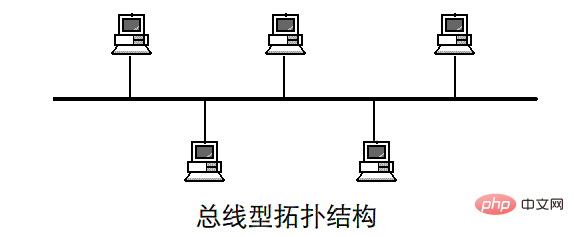
The bus-type structure is like a leaf, with a main line and many branches on the main line.
Disadvantages: All data needs to be transmitted through the bus, and the bus becomes the bottleneck of the entire network; occurrence Troubleshooting is difficult. In addition, due to channel sharing, there should not be too many connected nodes. Failure of the bus itself can cause the system to collapse. The most famous bus-type structure is Ethernet.
2. Star structure
The star structure is a radial interconnection structure with a central node as the center and connecting several peripheral nodes. This structure is suitable for local area networks, especially in recent years, most of the local area networks connected use this connection method. This connection method uses twisted pair or coaxial cable as the connection line.
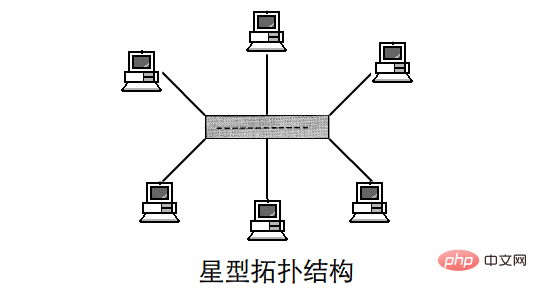
Advantages: Simple structure, easy to implement, and easy to manage. The hub is usually used as the central node to facilitate network maintenance and network management.
Disadvantages: The central node is a reliable bottleneck of the entire network. Failure of the central node will cause network paralysis.
3. Ring structure
Each node of the ring structure forms a closed loop through communication lines. Data in the ring can only be transmitted in one direction, and the delay time of information on each device is fixed. . Especially suitable for real-time control LAN systems.
The ring structure is like a string of pearl necklaces, and each computer on the ring structure is a bead on the necklace.
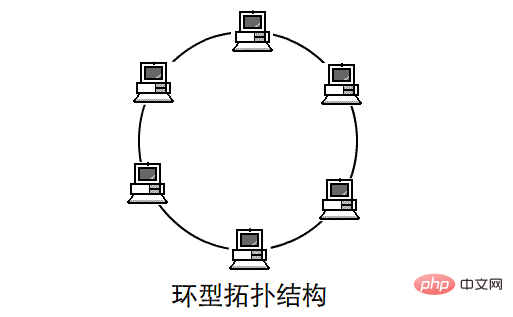
Advantages: Simple structure, suitable for Using optical fiber, the transmission distance is long and the transmission delay is determined.
Disadvantages: Each node in the ring network becomes a bottleneck for network reliability. Failure of any node will cause network paralysis. In addition, fault diagnosis is also difficult. The most famous ring structure network is Token Ring
4. Tree structure
The tree topology is a hierarchical structure. The nodes are connected hierarchically and information is exchanged. It is mainly performed between upper and lower nodes, and data is generally not exchanged between adjacent nodes or nodes at the same level. The tree topology is the tree in the data structure.
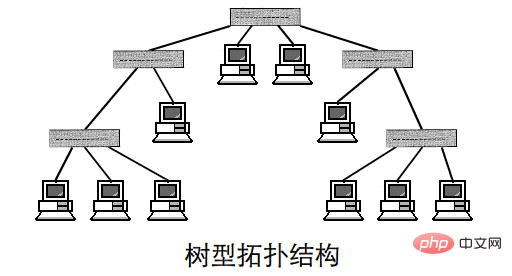
Advantages: simple connection, easy maintenance, suitable for application requirements of gathering information.
Disadvantages: The resource sharing capability is low and the reliability is not high. The failure of any workstation or link will affect the operation of the entire network.
5. Mesh structure
The network topology is also called an irregular structure. The connections between nodes are arbitrary and irregular. The mesh structure is the graph in the data structure. The mesh structure is the graph in the data structure.
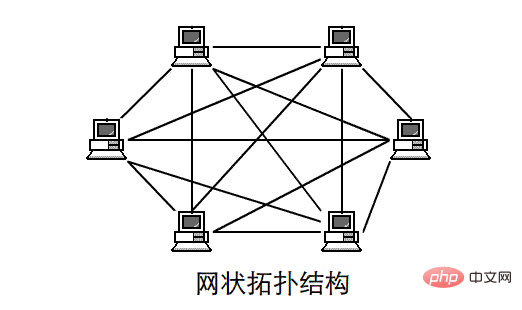
Advantages: The system has high reliability and is relatively easy to expand, but the structure is complex. Each node is connected to multiple points, so routing algorithms and flow control methods must be used. At present, wide area networks basically adopt a mesh structure.
Related learning recommendations:Website construction tutorial
The above is the detailed content of Briefly describe the characteristics of five network topologies. For more information, please follow other related articles on the PHP Chinese website!